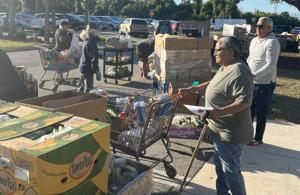Food pantries are experiencing a surge in demand as federal SNAP benefits come to an end this weekend. Many residents in the region are turning to these services for the first time, seeking assistance to manage their increasingly tight budgets.
The cessation of these federal benefits on March 2, 2024, has left numerous families grappling with heightened financial strain. According to the Food Bank Coalition, a local organization dedicated to addressing food insecurity, the number of individuals accessing food pantry services has risen significantly. Many families are now relying on these resources to meet their basic nutritional needs.
As the demand for food assistance escalates, local food pantries are facing challenges in meeting the needs of the community. Many organizations report depleting supplies and an urgent need for donations. Jane Smith, director of the Community Food Pantry, stated, “We are witnessing an unprecedented increase in clients. Many are first-time visitors, and our shelves are quickly emptying.”
The situation is compounded by rising food prices and inflation, which have made it increasingly difficult for families to stretch their budgets. A recent report from the U.S. Department of Agriculture highlighted that food prices have increased by approximately 8% over the past year, further straining household finances.
Local governments and community organizations are mobilizing to address this growing crisis. Efforts include organizing food drives and increasing outreach to ensure that those in need are aware of available resources. The United Way is partnering with food banks to streamline donation processes and enhance food distribution networks.
In addition to food assistance, organizations are encouraging residents to seek help with budgeting and financial planning. Workshops are being offered to help families manage their finances during these challenging times. “It’s not just about food; it’s about helping families find stability,” noted Mark Johnson, a financial advisor working with the local community service agency.
The increasing reliance on food pantries underscores the need for ongoing support and resources. As families continue to face economic challenges, local food banks and pantries are stepping up to ensure that no one goes hungry. The community’s response will be crucial in addressing food insecurity as federal benefits come to a close.
In conclusion, the cessation of SNAP benefits this weekend has created a critical situation for many residents. Food pantries are at the forefront of supporting those in need, but they require additional resources to meet the demand. Community involvement and support will be essential in navigating this difficult period.







